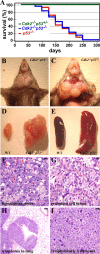Cdk2 and Cdk4 activities are dispensable for tumorigenesis caused by the loss of p53
- PMID: 19307310
- PMCID: PMC2682046
- DOI: 10.1128/MCB.00952-08
Cdk2 and Cdk4 activities are dispensable for tumorigenesis caused by the loss of p53
Abstract
The loss of p53 induces spontaneous tumors in mice, and p53 mutations are found in approximately 50% of human tumors. These tumors are generally caused by a number of events, including genomic instability, checkpoint defects, mitotic defects, deregulation of transcriptional targets, impaired apoptosis, and G(1) deregulation or a combination of these effects. In order to determine the role of proteins involved in G(1) control in tumorigenesis, we focused on Cdk2 and Cdk4, two cyclin-dependent kinases that in association with cyclin E and cyclin D promote the G(1)/S phase transition. We analyzed the consequence of loss of Cdk2 in p53-null animals by generating Cdk2(-/-) p53(-/-) mice. These mice are viable and developed spontaneous tumors, predominantly lymphoblastic lymphomas, similar to p53(-/-) mice. In contrast, the genotypes Cdk4(-/-) p53(-/-) were mostly lethal, with few exceptions, and Cdk2(-/-) Cdk4(-/-) p53(-/-) mice die during embryogenesis at embryonic day 13.5. To study the oncogenic potential, we generated mouse embryonic fibroblasts (MEFs) and found that p53(-/-), Cdk2(-/-) p53(-/-), Cdk4(-/-) p53(-/-), and Cdk2(-/-) Cdk4(-/-) p53(-/-) MEFs grew at similar rates without entering senescence. Ras-transformed MEFs of these genotypes were able to form colonies in vitro and induce tumors in nude mice. Our results suggest that tumorigenicity mediated by p53 loss does not require either Cdk2 or Cdk4, which necessitates considering the use of broad-spectrum cell cycle inhibitors as a means of effective anti-Cdk cancer therapy.
Figures








References
-
- Ababneh, M., C. Gotz, and M. Montenarh. 2001. Downregulation of the Cdc2/cyclin B protein kinase activity by binding of p53 to p34Cdc2. Biochem. Biophys. Res. Commun. 283507-512. - PubMed
-
- Aleem, E., H. Kiyokawa, and P. Kaldis. 2005. Cdc2-cyclin E complexes regulate the G1/S phase transition. Nat. Cell Biol. 7831-836. - PubMed
-
- Berthet, C., E. Aleem, V. Coppola, L. Tessarollo, and P. Kaldis. 2003. Cdk2 knockout mice are viable. Curr. Biol. 131775-1785. - PubMed
-
- Berthet, C., K. D. Klarmann, M. B. Hilton, H. C. Suh, J. R. Keller, H. Kiyokawa, and P. Kaldis. 2006. Combined loss of Cdk2 and Cdk4 results in embryonic lethality and Rb hypophosphorylation. Dev. Cell 10563-573. - PubMed
Publication types
MeSH terms
Substances
Grants and funding
LinkOut - more resources
Full Text Sources
Molecular Biology Databases
Research Materials
Miscellaneous
